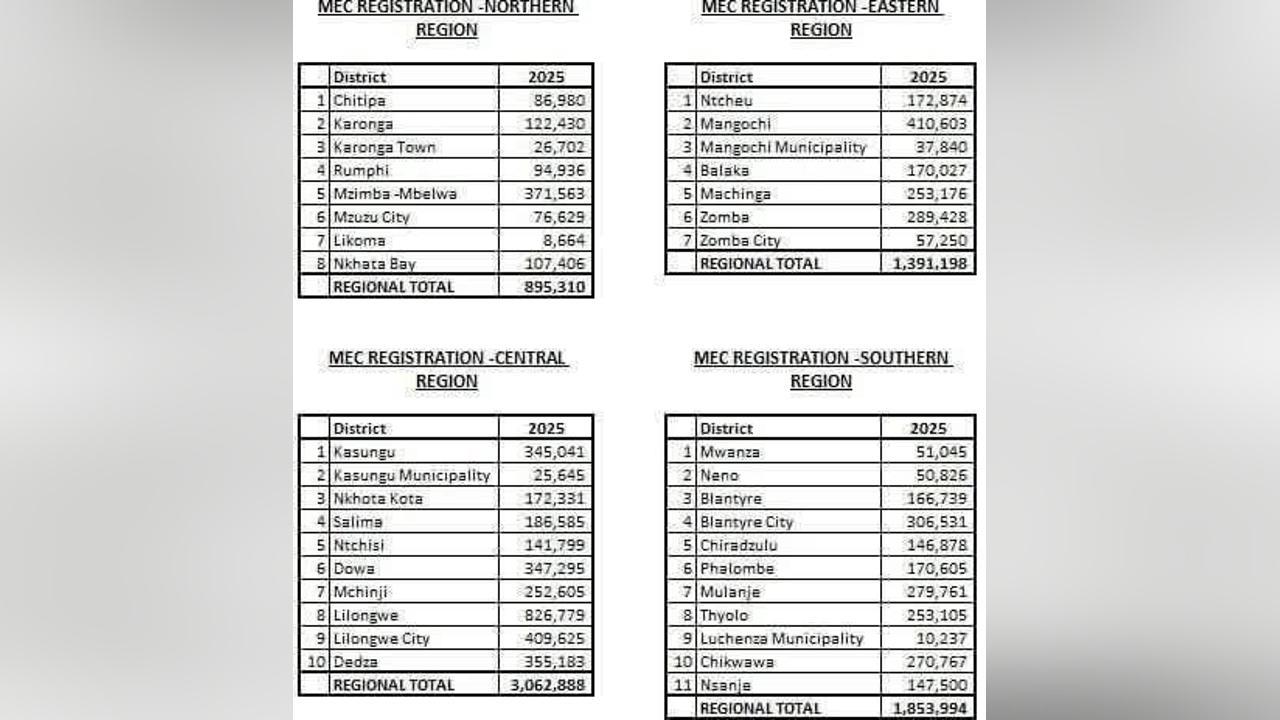By nyasatimes.
Africa-Press – Malawi. With the Malawi Electoral Commission (MEC) announcing that 7.2 million voters have registered for the 2025 general elections, a closer look at the numbers reveals that the Malawi Congress Party (MCP) enters the race with a distinct advantage over its rivals.
While both the Democratic Progressive Party (DPP) and the United Democratic Front (UDF) remain influential in their traditional strongholds, the regional spread of voters and the dynamics of political alliances suggest that MCP could once again command a winning edge — especially with the introduction of Vitumbiko Mumba as its running mate from the North.
Central Region: MCP’s Powerhouse
The Central Region has emerged as the most decisive bloc, contributing 3,062,888 registered voters, or 40 percent of the national roll. MCP has historically dominated this region, and with the incumbent advantage, the party is projected to retain overwhelming support here. Even if the opposition picks pockets of support in Dedza or Salima, the Central Region alone puts MCP within striking distance of a national majority.
Southern Region: Divided Opposition
Traditionally the bedrock of the DPP, the South accounts for 1,853,994 voters. DPP remains strong in Thyolo, Mulanje, Phalombe, Zomba, and Balaka, but its monopoly is no longer guaranteed.
This time, the region is more fragmented than ever:
UDF is holding firmly to Mangochi and Machinga.
UTM, PDP, ODYA ZAKE and Joce Banda are each commanding slices of influence in different pockets.
Urban centres like Blantyre City are increasingly becoming battlegrounds, where MCP is making steady inroads among youth and working-class voters.
The split means that even if DPP retains dominance in its core zones, its overall margin in the South is likely to shrink significantly.
Eastern Region: UDF Holds the Keys
The Eastern Region brings 1,391,198 voters. Here, UDF has traditionally dominated Mangochi and Machinga, while DPP holds sway in Ntcheu and parts of Zomba. MCP has been historically weak in this region, but the ongoing divisions between DPP and UDF open a window for the ruling party to capture a modest but meaningful share of 15–20 percent.
Most crucially, UDF has confirmed it will run independently in 2025. This effectively prevents the opposition from consolidating the Eastern vote, and in doing so, indirectly strengthens MCP’s national prospects.
Northern Region: The Game Changer
With 895,310 registered voters, the North may be the smallest bloc, but it is the most unpredictable — and potentially decisive.
Historically, the region has voted issue-based rather than tribally, making it a swing area. This time, however, MCP has fielded Vitumbiko Mumba as its running mate, giving the party a powerful entry point. DPP’s influence has waned here, in part due to past accusations of marginalization, while UTM’s earlier grip appears to be weakening without visible momentum.
If MCP secures a majority in the North, its Central Region dominance would be enough to build an insurmountable national lead.
What the Numbers Say:
Central Region (MCP stronghold): 3,062,888 voters
Southern Region (DPP base, but split): 1,853,994 voters
Eastern Region (UDF battleground): 1,391,198 voters
Northern Region (swing, MCP running mate advantage): 895,310 voters
National Total: 7,203,390 voters
In pure numerical terms, MCP’s dominance in the Centre already secures nearly half of the votes it needs. If it adds just half of the North and even a quarter of the Southern and Eastern urban vote, it can comfortably cross the 50 percent threshold needed to win outright.
Analysis: Path to Victory Tilting Toward MCP
MCP’s strength lies in its overwhelming Central Region dominance and its strategic running mate from the North.
DPP’s challenge is that even though it remains strong in the South, the region’s fragmentation and the loss of UDF as an ally weaken its overall capacity.
UDF, by running independently, plays the spoiler role: while it cannot win outright, its presence splits the opposition vote, indirectly favouring MCP.
The North becomes the decider, and with Vitumbiko Mumba on the ticket, MCP is better positioned than DPP to capture it.
Conclusion
The 2025 elections will ultimately be decided not just by strongholds, but by swing regions and alliances. With the Central Region locked, the North tilting, and the South fractured, the arithmetic and the politics both suggest that MCP has the clearest path to victory.
If DPP cannot secure a last-minute alliance with UDF or reclaim lost urban ground, the numbers indicate that Malawi may be heading toward another MCP-led administration.
Source: Malawi Nyasa Times
For More News And Analysis About Malawi Follow Africa-Press






